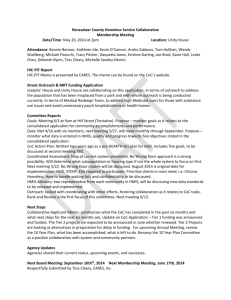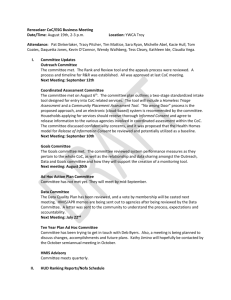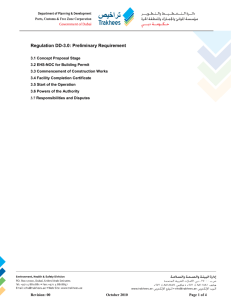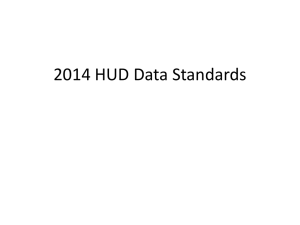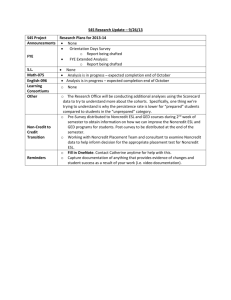Certificate of Compliance (CoC) electrical safety
advertisement
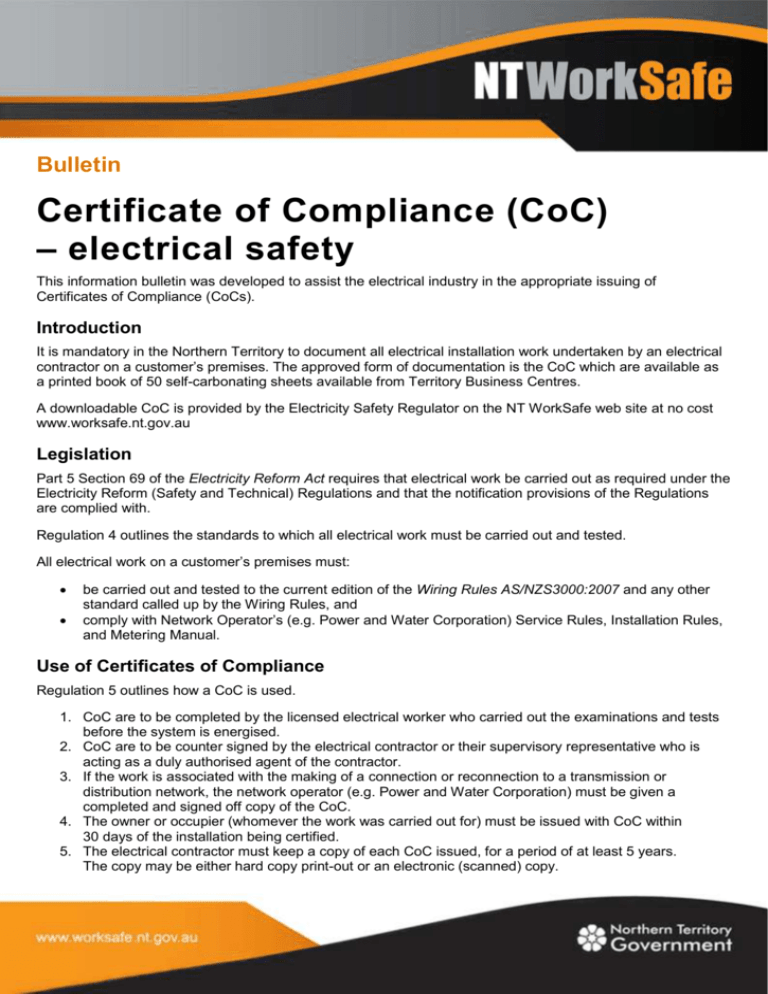
Bulletin Certificate of Compliance (CoC) – electrical safety This information bulletin was developed to assist the electrical industry in the appropriate issuing of Certificates of Compliance (CoCs). Introduction It is mandatory in the Northern Territory to document all electrical installation work undertaken by an electrical contractor on a customer’s premises. The approved form of documentation is the CoC which are available as a printed book of 50 self-carbonating sheets available from Territory Business Centres. A downloadable CoC is provided by the Electricity Safety Regulator on the NT WorkSafe web site at no cost www.worksafe.nt.gov.au Legislation Part 5 Section 69 of the Electricity Reform Act requires that electrical work be carried out as required under the Electricity Reform (Safety and Technical) Regulations and that the notification provisions of the Regulations are complied with. Regulation 4 outlines the standards to which all electrical work must be carried out and tested. All electrical work on a customer’s premises must: be carried out and tested to the current edition of the Wiring Rules AS/NZS3000:2007 and any other standard called up by the Wiring Rules, and comply with Network Operator’s (e.g. Power and Water Corporation) Service Rules, Installation Rules, and Metering Manual. Use of Certificates of Compliance Regulation 5 outlines how a CoC is used. 1. CoC are to be completed by the licensed electrical worker who carried out the examinations and tests before the system is energised. 2. CoC are to be counter signed by the electrical contractor or their supervisory representative who is acting as a duly authorised agent of the contractor. 3. If the work is associated with the making of a connection or reconnection to a transmission or distribution network, the network operator (e.g. Power and Water Corporation) must be given a completed and signed off copy of the CoC. 4. The owner or occupier (whomever the work was carried out for) must be issued with CoC within 30 days of the installation being certified. 5. The electrical contractor must keep a copy of each CoC issued, for a period of at least 5 years. The copy may be either hard copy print-out or an electronic (scanned) copy. Clarification of persons who may sign off a Certificate of Compliance Electrical workers should note that in signing off the electrical worker’s section of a CoC they will currently attract civil and regulatory liability should non-compliance be found with their work. Under certain circumstances a situation may occur where an electrical worker, who is working alone or without the presence of the electrical contractor’s nominee, must sign off the contractor’s section of the CoC to achieve an outcome (e.g. connection of power by Power and Water). This commonly occurs in isolated localities or after-hours call outs to loss of power situations where urgent repairs are required and attendance from a PowerWater Corporation line crew is required to connect or reconnect power. PowerWater Corporation line crews will not connect power to an installation without the yellow copy of a CoC being handed to them. PowerWater Corporation is legally obliged under Regulation 5(3) of the Electricity Reform (Safety and Technical) Regulations to obtain a copy of the CoC. Electrical workers have had concerns about signing off the contractor’s section of the CoC as they feel they may attract some legal liability by doing so. The Electricity Safety Regulator’s view In certain circumstances the licensed electrical worker may be duly authorised to sign off the CoC The Electricity Safety Regulator has considered the terms of Regulation 5(2)(b): “a person who has or had a supervisory role in relation to the worker and who is acting as a duly authorised agent of the contractor must, if satisfied that the standards and requirements referred to in Regulation 4 have been complied with in relation to the work, also complete and sign the certificate in accordance with the directions contained in it”. The Electricity Safety Regulator has taken the view that in certain circumstances a worker may be classified as self-supervised. This will occur in remote localities and on late night call outs. The Electricity Safety Regulator has also said that where it can be anticipated that a licensed electrical worker may work in isolation either at a remote locality or whilst on after-hours call, the contractor may duly authorise the licensed electrical worker(s) to sign off the contractor’s section of the CoCs on his/her behalf. Such authorisation must be in writing, and be produced upon request of the Electricity Safety Regulator. Caption: An example authorisation form 2 Certificate of Compliance (CoC) electrical safety (V1.1 – 11 March 2014) Alternatively where a situation occurs which was unanticipated, the electrical contractor may duly authorise the licensed electrical worker to sign off the contractor’s section of the CoC over the telephone, as long as the electrical contractor diarises the approval which must also be produced upon request of the Electricity Safety Regulator. The Electricity Safety Regulator has further suggested that where an electrical contractor authorises licensed electrical workers to sign off the contractor’s section of the CoC, the electrical contractor inspect the completed CoC and countersign the pink copy to demonstrate that the contractor does maintain supervision over the authorisation process. When a Certificate of Compliance is not required Exemptions In accordance with Section 87 (4) of the Electricity Reform Act, the Electricity Safety Regulator has exempted the following, unless requested by the person for whom the work was carried out, from the need to issue a CoC: Direct replacement of faulty or damaged electrical apparatus with the same type; and Motor rewinds (disconnects and reconnects) where the same motor is reinstalled. In all other cases a CoC must be completed. For example replacing a broken switch, power point or fan control with the same type would not require a CoC, however replacing a broken switch with, say, a combination light switch and power point would require a CoC as it is not a direct replacement. Similarly, replacing a stove or stove elements with those of the same wattage would not require a CoC. However if the stove or element is of a higher wattage resulting in an increase in the maximum demand of the installation then a CoC is required. Not exempt Please Note: Repairs requiring direct replacement of a mains connection box, any repairs to a meter box, any repairs to a switchboard and/or replacement of independent main switches are excluded from this exemption. If in doubt contact the NT WorkSafe Electrical Safety Unit. Electrical Safety Inspectors are available to assist you in any aspect of the Regulations and can, upon request, provide training in regard to CoC. Territory Business Centre (TBC) – Contact Details Phone: 1800 193 111 Postal: GPO Box 9800, DARWIN NT 0800 Email: territory.businesscentre@nt.gov.au Darwin TBC Ground Floor, Development House, 76 The Esplanade DARWIN NT Katherine TBC Shop 1, Randazzo Building, 18 Katherine Terrace KATHERINE NT Alice Springs TBC Ground floor, The Green Well Building, 50 Bath Street ALICE SPRINGS NT Tennant Creek TBC Shop 2, Barkly House. Corner Davidson and Patterson Streets TENNANT CREEK Contact us For further information please contact us on 1800 019 115, facsimile (08) 8999 5141, via email at ntworksafe@nt.gov.au or go to the NT WorkSafe website at www.worksafe.nt.gov.au 3 Certificate of Compliance (CoC) electrical safety (V1.1 – 11 March 2014)
